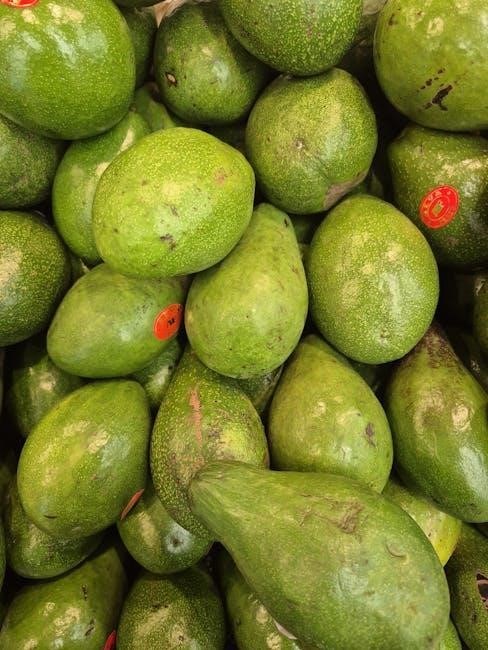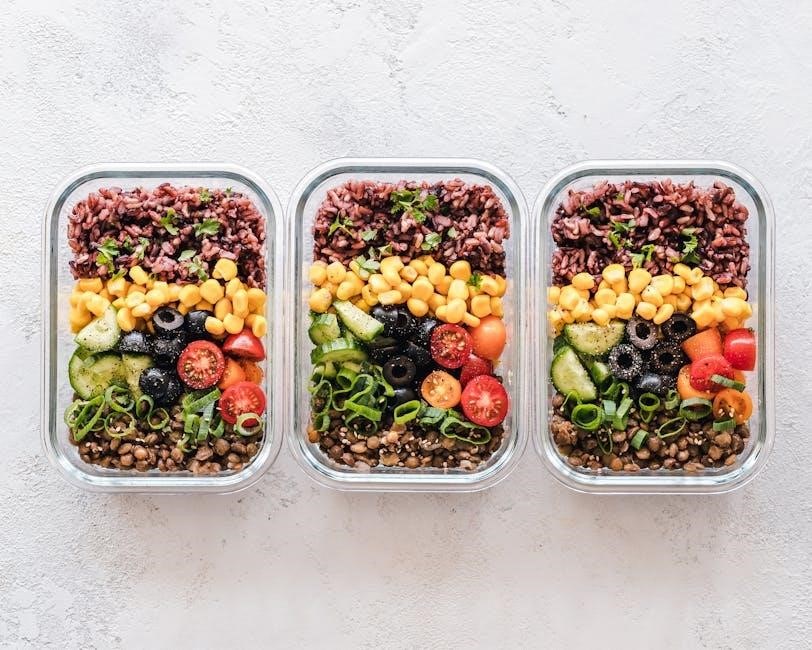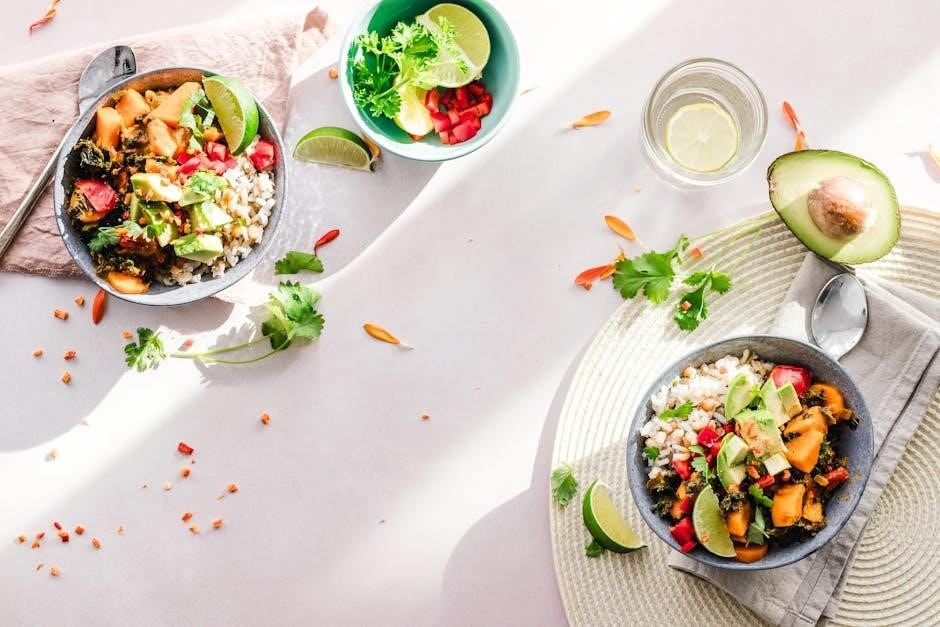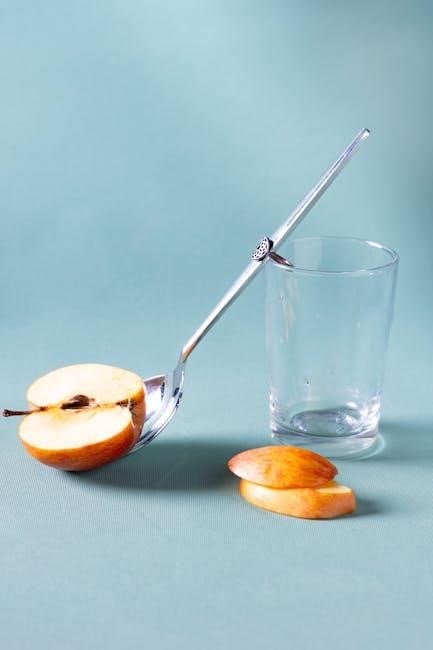A tailored diet plays a crucial role in managing peptic ulcers‚ focusing on symptom relief‚ healing‚ and preventing complications․ It emphasizes balanced nutrition and avoiding irritants․
1․1 Importance of Diet in Managing Peptic Ulcers
Diet plays a pivotal role in managing peptic ulcers by reducing symptoms and promoting healing․ A tailored diet helps avoid foods that irritate the stomach lining‚ such as spicy foods‚ alcohol‚ and caffeine‚ which can exacerbate symptoms․ Incorporating bland‚ low-acid foods can alleviate discomfort and support the healing process․ Additionally‚ a balanced diet rich in nutrients and fiber aids in tissue repair and overall digestive health․ Probiotics may also contribute by restoring gut bacteria balance․ Ensuring proper nutrition is essential for recovery and preventing recurrence‚ making diet a crucial component of effective peptic ulcer management․

1․2 Overview of the Peptic Ulcer Diet Plan
The peptic ulcer diet plan focuses on minimizing stomach irritation and promoting healing․ It emphasizes bland‚ easily digestible foods while avoiding triggers like alcohol‚ caffeine‚ and spicy or acidic foods․ The plan encourages lean proteins‚ low-fat dairy‚ and fiber-rich foods to support gut health․ Probiotics and non-citrus fruits are also recommended to aid digestion․ Meals should be small and frequent to reduce strain on the stomach․ Avoiding irritants and incorporating soothing foods can help manage symptoms and prevent recurrence․ This structured approach ensures optimal nutrition while supporting the healing process and maintaining overall digestive well-being․

Understanding Peptic Ulcers
Peptic ulcers are sores in the stomach lining or duodenum‚ causing pain and discomfort․ They disrupt digestion and can lead to complications if left untreated․

2․1 Symptoms of Peptic Ulcers
Peptic ulcers often cause a burning pain in the upper abdomen‚ typically between meals or at night․ Other symptoms include bloating‚ heartburn‚ and indigestion․ Some patients may experience nausea or vomiting․ In severe cases‚ dark stools or blood in vomit can indicate internal bleeding․ These symptoms can vary in intensity and may mimic other digestive disorders․ Proper diagnosis is essential to differentiate peptic ulcers from other conditions․ Managing symptoms through diet and lifestyle changes is crucial to support healing and prevent complications․ Early recognition of symptoms can lead to timely treatment․
2․2 Causes and Risk Factors of Peptic Ulcers
Peptic ulcers are primarily caused by Helicobacter pylori infection‚ long-term use of nonsteroidal anti-inflammatory drugs (NSAIDs)‚ and excessive acid production․ Risk factors include smoking‚ alcohol consumption‚ and genetic predisposition․ Stress and certain medical conditions‚ like Zollinger-Ellison syndrome‚ can also contribute․ A diet high in spicy or acidic foods may exacerbate symptoms․ Aging increases vulnerability due to reduced stomach lining protection․ Identifying and addressing these factors is key to effective management and prevention․ Understanding the underlying causes helps tailor treatment plans‚ including dietary adjustments․ Early intervention can prevent complications like bleeding or perforation․
General Dietary Recommendations
Peptic ulcers are primarily caused by Helicobacter pylori infection and prolonged use of nonsteroidal anti-inflammatory drugs (NSAIDs)․ Excessive stomach acid production also contributes․
Risk factors include smoking‚ alcohol consumption‚ genetics‚ and stress․ Certain conditions like Zollinger-Ellison syndrome can increase acid secretion․ Aging reduces stomach lining protection‚ heightening vulnerability․ Addressing these factors is crucial for effective management and prevention of complications․
3․1 Foods to Avoid for Peptic Ulcer Management
To manage peptic ulcers effectively‚ certain foods should be avoided as they can trigger symptoms and delay healing․ These include spicy foods‚ alcohol‚ caffeine‚ and citrus fruits‚ which can irritate the stomach lining․ High-fat or fried foods and processed meats may also worsen discomfort․ Avoiding carbonated beverages like soda can help reduce bloating and acid reflux․ Additionally‚ foods high in acidity‚ such as tomatoes and vinegar-based products‚ should be limited․ Eliminating these foods from the diet can help create a more healing-friendly environment for the stomach and reduce discomfort․ A tailored approach ensures individual triggers are addressed to support recovery․ Consistency is key․
3․2 Foods to Include in the Diet
Incorporating the right foods is essential for managing peptic ulcers․ High-fiber foods like whole grains‚ legumes‚ and vegetables support healing and reduce acid production․ Probiotic-rich foods‚ such as yogurt and kefir‚ promote gut health and aid digestion․ Lean proteins like poultry‚ fish‚ and eggs are gentle on the stomach․ Healthy fats‚ including avocado and olive oil‚ are also beneficial․ Incorporating low-acid fruits like bananas and melons can provide essential nutrients without irritation․ Additionally‚ herbal teas like chamomile and ginger tea may soothe the stomach lining․ A balanced diet focusing on these foods helps alleviate symptoms and supports recovery․ Consistency is key for optimal results․
Foods That Help Heal the Stomach Lining
Foods rich in probiotics‚ like yogurt and kefir‚ along with high-fiber options such as whole grains and vegetables‚ aid in healing the stomach lining and reducing inflammation․
4․1 Role of Probiotics in Ulcer Healing
Probiotics play a significant role in ulcer healing by restoring the balance of gut flora․ They help reduce inflammation and inhibit harmful bacteria‚ such as H․ pylori‚ which can cause ulcers․ Probiotic-rich foods like yogurt‚ kefir‚ and fermented vegetables can reduce the side effects of antibiotics often used in treatment․ Additionally‚ probiotics aid in healing the stomach lining‚ promoting a faster recovery and preventing recurrence․ Incorporating probiotic supplements or foods into the diet can enhance the effectiveness of the treatment plan and improve overall gastrointestinal health․
4․2 Benefits of High-Fiber Foods
High-fiber foods are essential for managing peptic ulcers as they help lower stomach acid production and improve digestion․ Fiber-rich foods like whole grains‚ fruits‚ and vegetables form a protective barrier against acid‚ reducing irritation and promoting healing․ They also support the growth of beneficial gut bacteria‚ which can prevent infections like H․ pylori․ A diet high in fiber can reduce the risk of complications and alleviate symptoms such as bloating and discomfort․ Incorporating fiber-rich foods into meals helps create a balanced and healing-focused diet for peptic ulcer patients․

Meal Planning and Preparation Tips
Proper meal planning helps manage peptic ulcer symptoms by avoiding triggers․ Opt for small‚ frequent meals‚ and focus on bland‚ easily digestible foods․ Incorporate probiotics and avoid spicy or acidic ingredients to support healing․
5․1 Sample Meal Plan for Peptic Ulcer Patients
A sample meal plan for peptic ulcer patients includes oatmeal or scrambled eggs for breakfast‚ steamed vegetables or lean proteins for lunch‚ and bland cooked meals for dinner․ Snacks like yogurt or bananas are recommended․ Avoid spicy‚ acidic‚ or fatty foods․ Incorporate probiotics‚ such as yogurt or kefir‚ to support gut health․ Small‚ frequent meals help manage symptoms․ Ensure meals are low in acid and high in fiber to promote healing․ This plan minimizes irritation and supports the stomach lining’s recovery․ Always consult a healthcare provider for personalized adjustments․
5․2 Tips for Preparing Easily Digestible Meals

To prepare easily digestible meals for peptic ulcer patients‚ focus on gentle cooking methods like steaming‚ boiling‚ or baking․ Avoid frying or grilling‚ as these can irritate the stomach․ Use minimal seasoning and avoid spicy or acidic ingredients․ Incorporate probiotic-rich foods like yogurt or kefir to support gut health․ Opt for lean proteins‚ such as chicken or fish‚ and pair them with soft‚ non-irritating vegetables like carrots or zucchini․ Avoid fatty or greasy foods‚ as they can trigger discomfort․ Eating small‚ frequent meals throughout the day can also help manage symptoms․ Always ensure meals are bland and free from triggers to promote healing․

Lifestyle Changes to Support the Diet
Adopting healthy habits‚ such as avoiding alcohol and smoking‚ managing weight‚ and reducing stress‚ complements dietary efforts to heal and prevent peptic ulcers effectively․
6․1 Managing Weight to Reduce Ulcer Risk
Maintaining a healthy weight is essential for reducing peptic ulcer risk․ Excess weight can increase stomach pressure‚ leading to acid reflux and ulcer formation․ A balanced diet combined with regular physical activity helps manage weight effectively․ Avoid crash diets and focus on gradual weight loss through portion control and nutrient-rich meals․ Even a modest reduction in body mass index (BMI) can significantly lower the risk of developing ulcers․ Consulting a healthcare provider or dietitian can provide personalized strategies for sustainable weight management․
6․2 Avoiding Alcohol and Smoking
Eliminating alcohol and smoking is crucial for managing peptic ulcers․ Alcohol irritates the stomach lining‚ increasing acid production and delaying healing; Smoking weakens the lower esophageal sphincter‚ allowing acid to rise and exacerbate symptoms․ Both habits can reduce the effectiveness of medications and prolong recovery․ Quitting smoking and avoiding alcohol not only supports ulcer healing but also reduces the risk of complications․ Incorporating stress management techniques can help individuals avoid these habits․ Consulting a healthcare provider for cessation programs can significantly improve overall health and promote a faster recovery from peptic ulcers․
Adopting a tailored diet and lifestyle changes are essential for managing peptic ulcers effectively․ By focusing on balanced nutrition‚ avoiding irritants‚ and incorporating foods that promote healing‚ individuals can alleviate symptoms and prevent recurrence․ Probiotics‚ high-fiber foods‚ and avoiding alcohol and smoking are key strategies for optimal recovery․ Consistency and adherence to dietary recommendations‚ along with medical treatment‚ significantly improve outcomes․ Consulting a healthcare provider ensures personalized advice‚ leading to faster healing and a reduced risk of complications․ A well-managed diet and lifestyle play a vital role in achieving long-term relief and overall digestive health for peptic ulcer patients․


